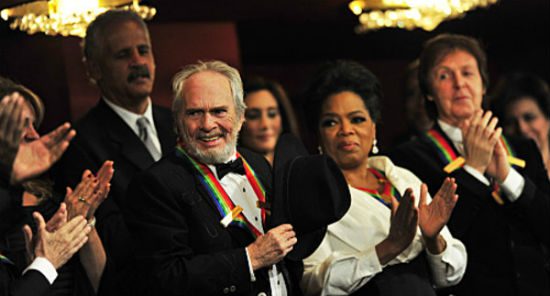Country music legend Merle Haggard has died. He was 79. But then I think he was always 79.
“Haggard didn’t just sing about the life described in country songs,” CNN’s report says. “He lived it”:
His father died when Haggard was a child, and he ran away from home and later served time in prison. He drank — one of his best-known songs is called “I Think I’ll Just Stay Here and Drink” — and partied. He was married five times.
Haggard’s song titles were plainspoken and evocative. “I’m a Lonesome Fugitive.” “Sing Me Back Home.” “Branded Man.” “The Bottle Let Me Down.” “If We Make It Through December.” He may not have written all of his hits, but he sang them with a pure feeling that left no doubt of the pain — and the joy — inside.
He wrote and sang some terrific songs, and he collaborated and hung out with some of my favorite artists in the world of country music, but I had a hard time getting past Haggard’s angry right-wing tribalism (whether he meant any of that, or if he was just selling records, isn’t clear, but also doesn’t really matter). He spent too much time and energy drawing lines and peeing on trees to mark his territory for me to ever regard him fondly. He helped spawn the current brand of country music that’s about being country music — tribal boundary-keeping that masks the fact that most of it’s just pop-rock sung with a Southern accent.

So I’ve never quite absorbed whatever it is that made Merle Haggard the favorite right-wing singer of so many progressives. The terrific 1990 New Yorker profile by Bryan Di Salvatore that Erik Loomis links to there discusses a similar frustration:
It is an unfortunate irony that Merle Haggard, probably the most musically diverse singer in country music, should be inextricably linked with a casual ditty — a passably catchy tune — that shifted attention from his musicianship, which is highly articulate, to his politics, which are not. …
Over the years, Merle’s explanation of the impulse behind “Okie” has varied, and his basic political orientation — an instinctive right-wing populism — has found expression as everything from stouthearted flag-waving to the maunderings of a day drinker down at the corner tavern. Merle doesn’t read much. … He has also said that his heroes, in addition to his father, are Bob Wills, Joe Louis, Bing Crosby, and Franklin Roosevelt, and that “evolution is a laughing matter for anybody that’s got a rational mind.”
It wasn’t just “Okie From Muskogee.” Haggard returned to those hippie-punching, white-patriot themes repeatedly. Again, maybe that was just an attempt to recapture the commercial success of “Okie,” but the effect matters more than the murky motive.
Last month, David Roberts offered a long, smart, insightful and empathetic discussion of “White working-class nostalgia, explained by John Wayne.” You should read the whole thing. Roberts, I think, does a terrific job of exploring the dreams and desires of the sort of angry white folks who are now rallying behind, of all people, Donald Trump and his call to “Make America Great Again.” (It parallels much of what I said — with less patience and sympathy — here.)
But if you haven’t got time to read the whole thing just now, watch this instead. This is Merle Haggard singing his 1982 song “Are the Good Times Really Over For Good?” in 2011:
Pay attention particularly to where the audience cheers. That’s what Roberts is talking about.
The real tragedy of that schlocky, tribal anthem, though, is that Merle Haggard was capable of so much else. He could have written a love song — or a divorce song — titled “Are the Good Times Really Over for Good?” and it surely would have been as haunting and heartbreaking as the unspoken resignation of “If We Make It Through December.” The man really could sing, when he wanted to.
















